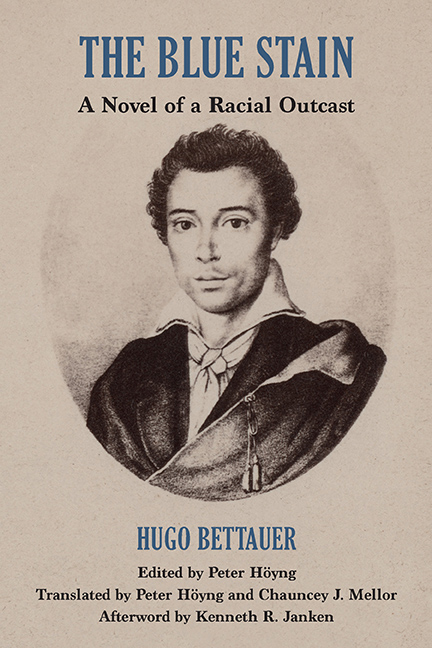Afterword
Published online by Cambridge University Press: 21 August 2018
Summary
Amelodramatic novel that moves at a breathless pace, Austrian journalist Hugo Bettauer's The Blue Stain has much in common with the modernist literature of the Harlem Renaissance era, as it plumbs the alienation of its mixed-race protagonist Carlo Zeller. Carletto, as he comes to be called, is the child of a German botany professor and a barely literate mulatto daughter of Georgia tenant farmers. The title is a reference to the myth that no matter how light-complexioned an African American might be, she or he can always be identified by the allegedly blueish tinge to the lunula of the fingernail. (More about this detection method anon, along with another foolproof method employed by whites for detecting African Americans who tried to pass: using their noses to sniff the suspect for blacks’ telltale unpleasant odor.) As an avowedly anti-racist Bildungsroman, it shares a conceit with other writings of the time that Europe and Europeans were more hospitable to African Americans than the United States generally and the American South in particular. And like that other writing, it caricatures southern whites as possessing the outward trappings of civilization but being essentially morally depraved and prone to outbursts of violence for the purposes of punishing and terrorizing African Americans and as a source of entertainment and diversion in small-town life. And yet, for all its eff orts to embrace a forward-looking point of view, including notably its closing embrace of the civil rights program of the National Association for the Advancement of Colored People, The Blue Stain trades in the casual racism that infects the works of many of the moderns and promotes retrograde stereotypes of the unchecked sexual urges of black women and men and the race's uncivilized nature generally. This mixed and unstable legacy of an ostensibly anti-racist novel is the central concern of this afterword.
The Blue Stain is replete with restless characters trying either to escape their pasts or to come to terms with new worlds they find unwelcoming and alien. Michael North in his suggestive Reading 1922 (1999) and Clare Corbould in her excellent Becoming African American (2009) identify peripatetic behavior as a hallmark of the modern.
- Type
- Chapter
- Information
- The Blue StainA Novel of a Racial Outcast, pp. 133 - 144Publisher: Boydell & BrewerPrint publication year: 2017

